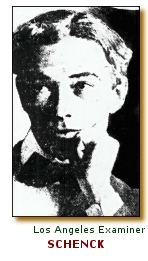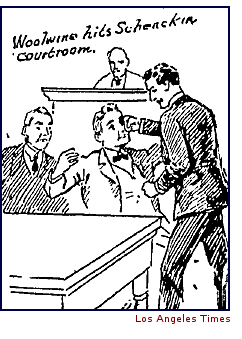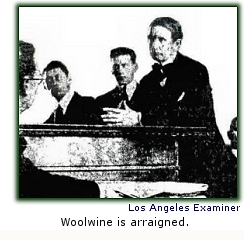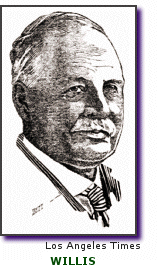Monday, May 7, 2007
Page 7
PERSPECTIVES (Column)
District Attorney Woolwine Fined for Contempt, Pleads Guilty to Misdemeanors
By ROGER M. GRACE
Thirty-Sixth in a Series
THOMAS LEE WOOLWINE, the county’s district attorney from 1915-23, had a fiery temper. On two occasions, he belted opposing counsel in court.
The first time was in 1909, when he was a private practitioner. As recounted here last week, the lawyer representing the other side in a probate matter told Woolwine, “You’re a liar,” and Woolwine punched him in the jaw. He explained later: “When he called me a liar I had to strike him.”
The second time was on the morning of March 16, 1921. By then, Woolwine had been district attorney for more than six years. A defense lawyer asked a prosecution witness a question, Woolwine took personal offense to it and, a few minutes later, socked opposing counsel in the nose.
He later issued a statement saying:
“[T]here are some things to which a man cannot submit, and among them is an aspersion upon his integrity....I do not think that the people of this county want a District Attorney who will submit to every insult and indignity that is offered him.”
Perish the thought that the people of the county would want a district attorney who abided by the law.
![]()
The particulars of the 1921 incident, gleaned from reports in the various Los Angeles dailies, are these:
Woolwine
was prosecuting a man charged with perpetrating a stock swindle. Defense lawyer
Paul Schenck asked an alleged victim whether it was true that Woolwine had
offered to have the money he lost restored to him if he testified. The prosecutor
viewed that as an allegation that he had attempted to suborn perjury, and
interjected:
whether it was true that Woolwine had
offered to have the money he lost restored to him if he testified. The prosecutor
viewed that as an allegation that he had attempted to suborn perjury, and
interjected:
“I want an objection here, your honor. This creature here who is accusing me of any such infamy as that ought to be reprimanded.”
Presiding
over the trial was Frank R. Willis (who had found Woolwine guilty of contempt
in 1915 for an insulting remark to opposing  counsel, fining him $10). Willis
said:
counsel, fining him $10). Willis
said:
“Mr. Schenck, unless you have witnesses to prove that, why, it is a very improper question.”
Woolwine and Schenck launched into a quarrel. Woolwine took his seat, then leaned over toward Schenck and called him a “son of a bitch.” Willis, rather than bringing the proceeding to order, declared a recess and ducked into his chambers.
Before the jury had left the courtroom, Woolwine went to the counsel table where Schenck was seated, exchanged a few works with him, then socked him, shouting that he was “a dirty son of a bitch and a crook.” Though not reflected in the Times’s cartoon, to the left, Schenck was wearing glasses.
Onlookers physically restrained the two lawyers, with Schenck bellowing that Woolwine was a “dirty coward” for hitting him while he was seated.
Woolwine replied:
“I’ll hit you any time, any place. Come into the alley.”
Willis returned to the bench simply to announce that proceedings would resume that afternoon.
![]()
Woolwine, in rapid succession of events, was arrested
in the courtroom by two officers on suspicion of battery…asked for the
courtesy of being allowed to go upstairs to his office for a few minutes, which
was granted…managed to elude the officers and leave the building…then appeared
in Police Court, representing himself, and pled not guilty. He was released on
his own recognizance.
the building…then appeared
in Police Court, representing himself, and pled not guilty. He was released on
his own recognizance.
A second complaint was issued for disturbing the peace in the courtroom. It was served on the DA in his office while reporters were interviewing him. By telephone, arrangements were made with the Police Court judge for Woolwine to appear voluntarily for his arraignment the next afternoon on the new charge, rather than being arrested.
Back in Willis’s courtroom that afternoon, Woolwine was ordered to show cause why he should not be held in contempt.
A new argument erupted between counsel during that afternoon session, with Woolwine roaring at his adversary: “You are a low down crooked son of a bitch and I’m not through with you yet.”
![]()
Two days later, the contempt matter was called. Woolwine said he did not wish to present testimony, but would stand on his affidavit.
In that document, he explained that Schenck had “in effect charged affiant with a felony,” that he tried during the recess to secure from him a retraction but Schenck became evasive, that he struck a light blow to “resent the insult” and get him to his feet.
In a brief address, Woolwine assured the judge that he had “meant no disrespect to the court,” and regretted that an inference of disrespect had been drawn. He added:
“Of course, if your honor please, if we were all angels no such [incidents] as these would happen.”
 Willis proceeded to admonish the district attorney (as quoted
in the Examiner):
Willis proceeded to admonish the district attorney (as quoted
in the Examiner):
“This affidavit [Woolwine’s] states that the blow was struck for the purpose of causing Mr. Schenck to get to his feet to continue this fight.
“I don’t know what the District Attorney would think if some person in the audience would strike another man in the face for the purpose of getting into a fight. It looks to me like it would be a violation of the statute.
“I believe you ordinarily do have respect for the courts, but I believe on occasions of this kind you lose your temper and do things your ordinary respect for the courts would not allow you to do.
“You owe a duty to the courts as a citizen to conduct yourself in a proper manner in a courtroom. It is your official duty to conduct yourself as an official should, and prevent, instead of promote, public offenses.
“This offense is agxainst the law, a matter of good order and conduct of the courts and it tends to bring the administration of justice into disrespect. We cannot ask the average citizen to obey the law if the District Attorney or any other attorney conducts himself improperly in court.”
The judge found Woolwine guilty of contempt of court and fined him $250. (That’s about $2,500 in terms of today’s dollars.)
On March 21, Woolwine paid the fine, by personal check.
![]()
Three days later, he appeared by counsel in the courtroom of a Police Court judge, and changed his plea to guilty. The judge imposed a fine of $25 for disturbing the peace, as well as $25 for the battery, the latter fine being suspended.
The Times’s account of March 31 says:
“Police Judge [William] Frederickson by questions asked Mr. Schenck indicated his belief that Mr. Woolwine acted under considerable provocation and also that the contempt fine had been adequate punishment for the outbreak in court.”
Schenck’s client was convicted of larceny, and a new trial was sought based on Woolwine having bashed Schenck’s nose in the presence of jurors. On April 2, Willis denied the motion.
![]()
Woolwine’s luck was holding out. In the 1909 episode, he slugged an attorney for the other side, and suffered no consequence. The judge did not look up from the papers he was reading.
In 1921, when Woolwine again took a poke at opposing counsel, he paid a contempt fine and a misdemeanor fine. He could have been jailed for the contempt and for the misdemeanors and, considering the egregiousness of the conduct, should have been.
Although the State Bar wasn’t in existence yet, attorney discipline was. Code of Civil Procedure §287 provided that “[a]n attorney and counselor may be removed or suspended by the Supreme Court, or any department thereof, or by any District Court of Appeal, or by any superior court of the state” for “any violation of the oath taken by him, or of his duties as such attorney and counselor.” It was the bar association for the county in which the attorney practiced that almost invariably brought the petition. Is it likely that the Los Angeles Bar Assn. would have desisted from seeking the suspension of an attorney who had committed a battery upon opposing counsel—and in the presence of the jury, on top of it—had the aggressor not been someone of such stature as the district attorney?
![]()
There were some who thought that a $250 contempt fine was not “adequate punishment”…and there was agitation in favor of a recall election.
A column appearing in the Times on Sunday, March 20, remarks:
“Politicians talked of little else last week than the Woolwine-Schenck embroglio and its possible political effects. In case the present recall movement threatened against Woolwine by those opposed to him becomes a fact, Robert O’Connor, present United States Attorney…will be put forward as a possible candidate for the position. And on the other hand, a very great many persons predict that the Woolwine-Schenck fisticuff affair will run its course as a nine-days’ sensation and then quietly pass into the recollections of the ‘I-remember-when’ class.”
Talk of a recall, based on the courtroom incident, proved short-lived. However, the prospect of a recall drive to oust Woolwine would again loom for other reasons.
![]()
The Times by 1921 thought more highly of the man it had blasted and belittled during the 1910 contest. It seemed to gain regard for Woolwine after he secured a life sentence in 1915 for Matthew Schmidt, a conspirator in the 1910 dynamiting of the Times Building. Its July 14, 1921 editorial alludes to Woolwine’s temper, but asserts his overall worth:
“Woolwine has proved on the whole a good District Attorney. Compared with similar administrations in other cities, his record is far above the average. There have been times when his hot southern blood has impelled him to do things not in keeping with the dignity of the office he occupies when his temper has gained ascendancy over his judgment; but, if his course has not always been wise, it has been courageous and honest.
“His record of conviction of notorious criminals is excellent....He is known to all criminals of whatever degree as an official who can neither be bullied nor bribed....”
![]()
Despite those words of praise, the Republican L.A. Times did not endorse the Democrat Woolwine for governor in 1922. When the Hearst-owned Los Angeles Examiner did—not surprising since the publisher of Hearst’s San Francisco Call was Woolwine’s campaign manager—the Times reprinted the Examiner’s 1914 editorial urging that Woolwine be defeated for district attorney based on his propensity for violence.
That editorial not only recites Woolwine’s 1909 striking of an attorney in court and his 1913 row with a neighbor during which he reportedly pulled a pistol, mentioned here last week, but also his threat to his brother-in-law during an argument that he would kill him; his altercation with a man on Spring Street which police had to break up; his interceding when his young son was having a fight with another boy, dragging the boy away, “throwing him down, and tearing his shirt”; and getting into a scrap with an “elevator boy” in the Douglas Building who was about 18, pulling a knife on him, being deterred from an attack through interference by a crowd.
The editorial reprinted by Times makes note of Woolwine’s “unfortunate temperamental qualifications”; asserts that “no one with a regard for the sacredness of life and respect for law and order” could vote for him; and labels him an “erratic, violent, dangerous character.”
![]()
Woolwine was not the only lawyer to belt his opposing counsel in court in that era. Such an incident also occurred in 1916. Delivering two blows to the chin of his adversary was W. Joseph Ford…the man Woolwine defeated for the post of district attorney in 1914. Ford’s client in the civil case was Woolwine, and the judge who was presiding was Willis.
That story is next to be told.
Copyright 2007, Metropolitan News Company